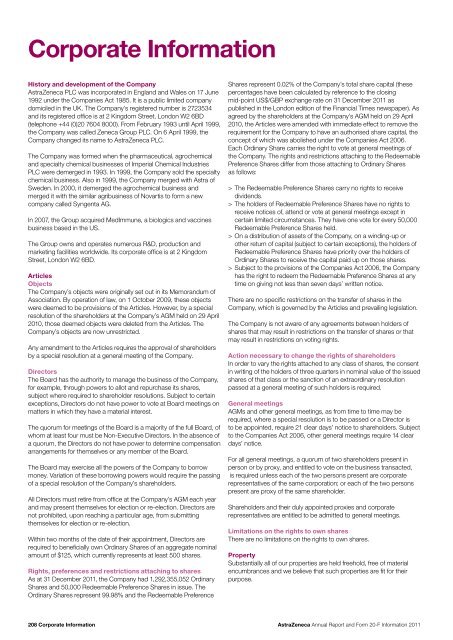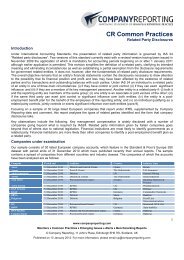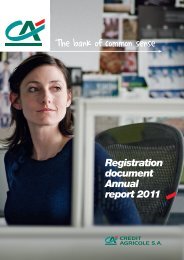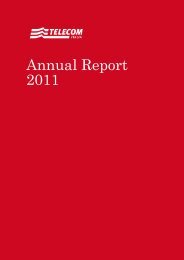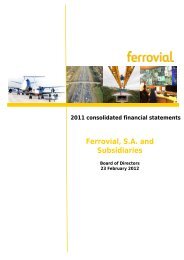AstraZeneca Annual Report and Form 20-F Information 2011
AstraZeneca Annual Report and Form 20-F Information 2011
AstraZeneca Annual Report and Form 20-F Information 2011
- No tags were found...
You also want an ePaper? Increase the reach of your titles
YUMPU automatically turns print PDFs into web optimized ePapers that Google loves.
Corporate <strong>Information</strong>History <strong>and</strong> development of the Company<strong>AstraZeneca</strong> PLC was incorporated in Engl<strong>and</strong> <strong>and</strong> Wales on 17 June1992 under the Companies Act 1985. It is a public limited companydomiciled in the UK. The Company’s registered number is 2723534<strong>and</strong> its registered office is at 2 Kingdom Street, London W2 6BD(telephone +44 (0)<strong>20</strong> 7604 8000). From February 1993 until April 1999,the Company was called Zeneca Group PLC. On 6 April 1999, theCompany changed its name to <strong>AstraZeneca</strong> PLC.The Company was formed when the pharmaceutical, agrochemical<strong>and</strong> specialty chemical businesses of Imperial Chemical IndustriesPLC were demerged in 1993. In 1999, the Company sold the specialtychemical business. Also in 1999, the Company merged with Astra ofSweden. In <strong>20</strong>00, it demerged the agrochemical business <strong>and</strong>merged it with the similar agribusiness of Novartis to form a newcompany called Syngenta AG.In <strong>20</strong>07, the Group acquired MedImmune, a biologics <strong>and</strong> vaccinesbusiness based in the US.The Group owns <strong>and</strong> operates numerous R&D, production <strong>and</strong>marketing facilities worldwide. Its corporate office is at 2 KingdomStreet, London W2 6BD.ArticlesObjectsThe Company’s objects were originally set out in its Memor<strong>and</strong>um ofAssociation. By operation of law, on 1 October <strong>20</strong>09, these objectswere deemed to be provisions of the Articles. However, by a specialresolution of the shareholders at the Company’s AGM held on 29 April<strong>20</strong>10, those deemed objects were deleted from the Articles. TheCompany’s objects are now unrestricted.Any amendment to the Articles requires the approval of shareholdersby a special resolution at a general meeting of the Company.DirectorsThe Board has the authority to manage the business of the Company,for example, through powers to allot <strong>and</strong> repurchase its shares,subject where required to shareholder resolutions. Subject to certainexceptions, Directors do not have power to vote at Board meetings onmatters in which they have a material interest.The quorum for meetings of the Board is a majority of the full Board, ofwhom at least four must be Non-Executive Directors. In the absence ofa quorum, the Directors do not have power to determine compensationarrangements for themselves or any member of the Board.The Board may exercise all the powers of the Company to borrowmoney. Variation of these borrowing powers would require the passingof a special resolution of the Company’s shareholders.All Directors must retire from office at the Company’s AGM each year<strong>and</strong> may present themselves for election or re-election. Directors arenot prohibited, upon reaching a particular age, from submittingthemselves for election or re-election.Within two months of the date of their appointment, Directors arerequired to beneficially own Ordinary Shares of an aggregate nominalamount of $125, which currently represents at least 500 shares.Rights, preferences <strong>and</strong> restrictions attaching to sharesAs at 31 December <strong>20</strong>11, the Company had 1,292,355,052 OrdinaryShares <strong>and</strong> 50,000 Redeemable Preference Shares in issue. TheOrdinary Shares represent 99.98% <strong>and</strong> the Redeemable PreferenceShares represent 0.02% of the Company’s total share capital (thesepercentages have been calculated by reference to the closingmid-point US$/GBP exchange rate on 31 December <strong>20</strong>11 aspublished in the London edition of the Financial Times newspaper). Asagreed by the shareholders at the Company’s AGM held on 29 April<strong>20</strong>10, the Articles were amended with immediate effect to remove therequirement for the Company to have an authorised share capital, theconcept of which was abolished under the Companies Act <strong>20</strong>06.Each Ordinary Share carries the right to vote at general meetings ofthe Company. The rights <strong>and</strong> restrictions attaching to the RedeemablePreference Shares differ from those attaching to Ordinary Sharesas follows:> The Redeemable Preference Shares carry no rights to receivedividends.> The holders of Redeemable Preference Shares have no rights toreceive notices of, attend or vote at general meetings except incertain limited circumstances. They have one vote for every 50,000Redeemable Preference Shares held.> On a distribution of assets of the Company, on a winding-up orother return of capital (subject to certain exceptions), the holders ofRedeemable Preference Shares have priority over the holders ofOrdinary Shares to receive the capital paid up on those shares.> Subject to the provisions of the Companies Act <strong>20</strong>06, the Companyhas the right to redeem the Redeemable Preference Shares at anytime on giving not less than seven days’ written notice.There are no specific restrictions on the transfer of shares in theCompany, which is governed by the Articles <strong>and</strong> prevailing legislation.The Company is not aware of any agreements between holders ofshares that may result in restrictions on the transfer of shares or thatmay result in restrictions on voting rights.Action necessary to change the rights of shareholdersIn order to vary the rights attached to any class of shares, the consentin writing of the holders of three quarters in nominal value of the issuedshares of that class or the sanction of an extraordinary resolutionpassed at a general meeting of such holders is required.General meetingsAGMs <strong>and</strong> other general meetings, as from time to time may berequired, where a special resolution is to be passed or a Director isto be appointed, require 21 clear days’ notice to shareholders. Subjectto the Companies Act <strong>20</strong>06, other general meetings require 14 cleardays’ notice.For all general meetings, a quorum of two shareholders present inperson or by proxy, <strong>and</strong> entitled to vote on the business transacted,is required unless each of the two persons present are corporaterepresentatives of the same corporation; or each of the two personspresent are proxy of the same shareholder.Shareholders <strong>and</strong> their duly appointed proxies <strong>and</strong> corporaterepresentatives are entitled to be admitted to general meetings.Limitations on the rights to own sharesThere are no limitations on the rights to own shares.PropertySubstantially all of our properties are held freehold, free of materialencumbrances <strong>and</strong> we believe that such properties are fit for theirpurpose.<strong>20</strong>8 Corporate <strong>Information</strong><strong>AstraZeneca</strong> <strong>Annual</strong> <strong>Report</strong> <strong>and</strong> <strong>Form</strong> <strong>20</strong>-F <strong>Information</strong> <strong>20</strong>11


